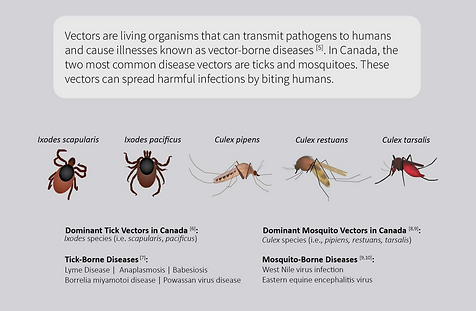The Effects of Climate Change on Vector-Borne Diseases in Canada
Visual Graphic Design / Public Health Initiative

Problem
As global temperatures continue to rise, vector-borne diseases become more efficient in their spread in local communities. Unfortunately, while climate change continues to promote the transmission of vector-borne diseases, most of the general public is still unaware of this emerging problem.
Task
To educate the general public and health professionals on how climate change can affect the transmission of vector-borne disease.
My process
- Brainstormed approaches for science communication and public engagement with PhD Students and professors. - Researched and developed appropriate design concept. - Refined and troubleshooted visual approaches with research collaborators


Attended weekly project meetings to seek feedback and revisions from team members. Following the meeting, revision were drafted and share with stakeholders for approval of concept and approach. Upon approval, draft revisions were implemented and incorporated into the final product.




Actions
- Applied for project funding from the National Collaborating Centre for Infectious Diseases (NCCID) - Participated in weekly meetings with the research team to identify communication approaches - Synthesize complex research findings into approachable and visually appealing illustrations
Results
Created a 12-page comic explaining the links between climate change and vector-borne diseases. The educational tool was emailed, printed and distributed across public health services across Canada. Sample pages from the comic can be found below



